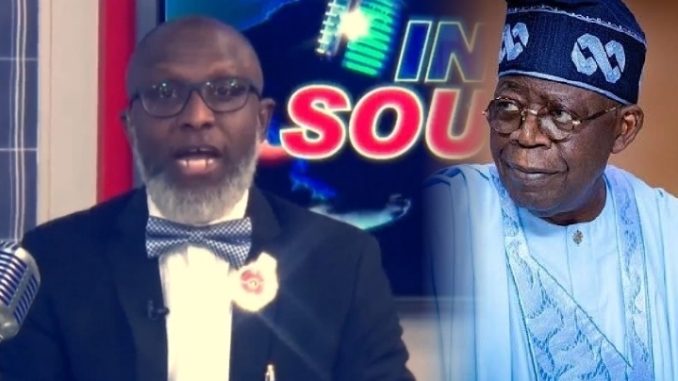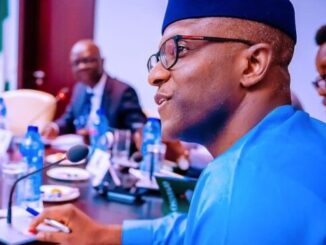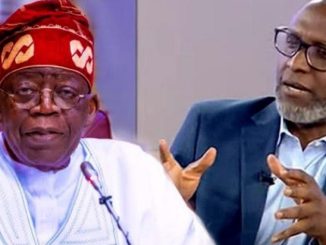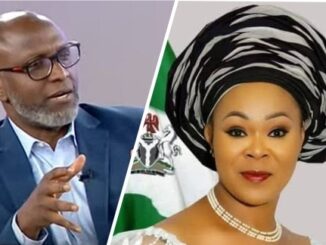
• Charges Tinubu to address reported smuggling allegations in Nigeria Customs Service
By Emmanuel Babafemi
Former Presidential Spokesperson, Laolu Akande, has denounced the Nigerian Police’s attempts to intimidate the Foundation for Investigative Journalism (FIJ) following its exposé on smuggling abuses within the Nigerian Customs Service.
During his “My Take” segment entitled “Who Will Tell The President” on the weekly Inside Sources with Akande talk show on Channels TV, aired on April 5, 2024, Akande expressed concern over the police actions, warning of potential damage to President Bola Ahmed Tinubu’s democratic standing.
Highlighting the vital role of investigative journalism in uncovering corruption, Akande emphasized that targeting journalists who expose wrongdoing undermines press freedom and transparency.
Following FIJ Founder/Editor-in-Chief Fisayo Soyombo’s documentary detailing alleged abuses within Customs, report broke out on Tuesday that Nigeria Police Force National Cybercrime Centre (NPF-NCCC) had invited and grilled Bukky Shonibare, the chairman of FIJ’s Board of Trustees, at their Abuja office, only letting her go after making her promise to “produce” Fisayo Soyombo, FIJ’s founder.
As a result, Akande called on President Tinubu to intervene, stressing the importance of allowing journalists to work without fear of reprisal and advocating for accountability within government institutions.
The incident has ignited discussions on press freedom and government accountability in Nigeria, prompting calls for a swift resolution to the FIJ-law enforcement standoff.
Amidst allegations targeting FIJ and Soyombo, Akande condemned what he termed as an attempt to criminalize journalism, urging the President to focus on addressing reported smuggling allegations rather than intimidating journalists.
It is believed the FIJ and Soyombo are being targeted following the undercover report exposing high-scale smuggling across Nigeria’s borders involving Ibrahim Egungbohun Dende, also known as IBD Dende.
In responding to FIJ’s report, IBD Dende petitioned Kayode Egbetokun, the Inspector General of Police (IGP), saying FIJ’s investigation amounted to “character assassination with a calculated view to achieve damaging effects against IBD Dende and his businesses within and outside Nigeria”.
In a poser, Akande wondered “Who will tell the president that instead of an investigation into an allegation of smuggling by known people that has been reported by journalists, especially the Foundation of Investigative Journalism, what we see is an attempt to criminalise journalism?”
“Instead of our authorities to investigate such allegations that are already reported publicly, what we are being told is that there are petitions against journalists. Who will tell the president the attempt to intimidate the press is not in Nigeria’s best interest and that it creates a poor reflection of a president that we all know is a true democrat? Going after him… is not the best way to go,” he said.
“Who will tell the president that all these are happening under his watch and it does have implications for his legacies,” Akande added.
The former Presidential aide in the remarks also called the attention of the president to the resumption of the suspended Social Investment Programmes (SIPs) which was suspended in January.
He then called the attention of the president to the investigative report on the suspended Minister of Poverty Alleviation, Dr Betta Edu.
He said “How long will it take for a decision to be taken on the report of the EFCC? And, how long will it take to have a substantive Minister in that Ministry? Or, has the President approved the idea to move some of the programmes to the Ministry of Finance?”
Akande, known for his advocacy for democratic values and human rights, emphasized the critical role of the press in fostering transparency, accountability, and democracy.
Here is a verbatim of the remarks as monitored on TV on Friday:
“And here is my take for this week entitled, ‘Who will tell the President?’
There are things that the public is interested in but seem not to be getting the due attention of the President. At least there is no communication about these things.
For instance, the restoration of social investment programmes.
Over a Month ago, it was announced that it would resume urgently even as an emergency, it is now April and it has not been restored.
Who will tell the president?
Specifically in February, the Coordinating Minister of the Economy, Mr Wale Edun said restarting the direct cash transfer was crucial to tackling rising food prices, especially elevated food prices, and the government’s ability to provide purchasing power to at least 60 million less well-off people.
Has this been done already?
Who will tell the president that these things need to be properly communicated for his own good? So that he can build trust with Nigerians.
Who will tell the president that the investigation of the suspended minister of humanitarian affairs, Betta Edu is taking too long?
How long will it take to decide on the EFCC report on the suspended minister?
And how long will it take to have a substantive minister named back to that ministry? Or has the President approved the idea to move some of the programmes to the Ministry of Finance?
Who will tell the president that the Emergency Economic Intervention Bill is still lying fallow on someone’s desk somewhere?
This is a bill that codifies some of the tax reform proposals from the president’s tax reform committee alongside other urgent economic measures. When is that bill going to be sent to the National Assembly? Members of the National Assembly are saying that they have had no movement on this bill since November. Who will tell the President?
Who will tell the president that now that the CBN is able to get the naira to some stability, it is time to tax luxury items that are being imported and cut off our heavy importation so that we can save the naira so that we can spend less on foreign exchange?
India did something similar when Mahatma Gandhi said “If India cannot feed herself let India starve, if India cannot clothe herself let India go naked.”
It was at a time when India was facing such a crisis as we are facing now in Nigeria. Tough times demand tough decisions.
Who will tell the president that it is time to take a tough decision on our taste for ostentatious imported materials? If it is not a medical emergency product, shouldn’t we suspend or at least discourage this kind of importation so that we can save and conserve forex?
Who will tell the President that instead of an investigation into an allegation of smuggling by known people that has been reported by journalists, especially the Foundation for Investigative Journalism, what we see is an attempt to criminalise journalism?
Instead of our authorities investigating allegations already reported publicly, what we are being told is that there are petitions against the journalist.
Who will tell the President that this attempt to intimidate the press is not good for Nigeria’s image and creates a poor reflection on a president we all know is a true democrat?
Who will tell the president that instead of encouraging civic engagement by young people, including the type that Fisayo Soyombo is representing by raising issues that have to do with the economic welfare of the Nigerian people, positive youth engagements are being discouraged by
these attempts which are distorted reality.
If the smuggling allegations that Fisayo Soyombo has reported are inaccurate and false, the government should tell us. Going after him and his board is not the way to go. Who will tell the President that all of these are happening under his watch and that it does have implications for his legacies?
One day, he will be former president, what is going to be said about attempts by people under him to intimidate journalists?
Who will tell the President that for months since Nigeria has withdrawn ambassadors from our embassies abroad, their replacements have not been announced and now, our embassies are operating below capacity without substantive envoys?
Who will tell the President that in diplomacy, the place of a properly ranked envoy cannot be compared to the place of somebody acting in that capacity? Who will tell the President that this is not in the interest of Nigeria’s foreign policy?
These are some of the issues that we hope that somebody who has the President’s ears will be frank enough to tell him about.
At the end of the day, it is about what the President does and what he does not do.
And there you have my take for the week.




